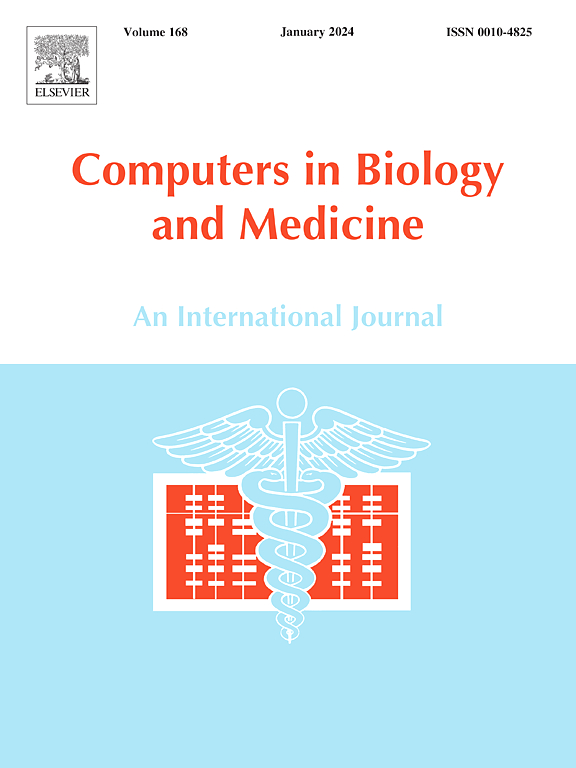新的基于肺叶的变压器模型(LobTe)预测α -1抗胰蛋白酶缺乏症患者肺气肿进展。
IF 6.3
2区 医学
Q1 BIOLOGY
引用次数: 0
摘要
肺气肿以不可逆转的肺组织破坏为特征,由于其异质性,给病情进展预测带来了挑战。早期检测对α-1抗胰蛋白酶缺乏症(AATD)患者尤为重要,这是一种降低ATT蛋白水平的遗传性疾病。杂合子携带者(PiMS 和 PiMZ)的 AAT 水平不一,从而使其预后复杂化。本研究引入了一种新的预后模型--基于肺叶的变压器编码器(LobTe),旨在利用 CT 扫描预测肺密度的年度变化(ΔALD [克/升-年])。LobTe 利用全局自我关注机制,专门分析肺叶组织的破坏情况,从而预测疾病的进展。与此同时,我们还开发了第二个模型,并对其进行了比较,该模型采用了 LSTM 架构,实现了针对特定对象的局部注意机制。我们的方法在 COPDGene 研究的 2,019 名参与者中进行了验证。LobTe 模型显示出较小的均方根误差(RMSE=1.73 g/L-yr)和显著的相关系数(ρ=0.61),可解释超过 35% 的 ΔALD 变异(R2= 0.36)。值得注意的是,它对 PiMZ 杂合子携带者的相关系数更高,达到了 0.68,这表明它在检测轻度至中度 AAT 缺乏的吸烟者的早期肺气肿进展方面非常有效。所提出的模型可作为监测疾病进展的工具,并为AATD携带者和受试者的治疗策略提供信息。我们的代码见 github.com/acil-bwh/LobTe。本文章由计算机程序翻译,如有差异,请以英文原文为准。
Novel Lobe-based Transformer model (LobTe) to predict emphysema progression in Alpha-1 Antitrypsin Deficiency
Emphysema, marked by irreversible lung tissue destruction, poses challenges in progression prediction due to its heterogeneity. Early detection is particularly critical for patients with Alpha-1 Antitrypsin Deficiency (AATD), a genetic disorder reducing ATT protein levels. Heterozygous carriers (PiMS and PiMZ) have variable AAT levels thus complicating their prognosis. This study introduces a novel prognostic model, the Lobe-based Transformer encoder (LobTe), designed to predict the annual change in lung density (ALD [g/L-yr]) using CT scans. Utilizing a global self-attention mechanism, LobTe specifically analyzes lobar tissue destruction to forecast disease progression. In parallel, we developed and compared a second model utilizing an LSTM architecture that implements a local subject-specific attention mechanism.
Our methodology was validated on a cohort of 2,019 participants from the COPDGene study. The LobTe model demonstrated a small root mean squared error (RMSE=1.73 g/L-yr) and a notable correlation coefficient (), explaining over 35% of the variability in ALD (R= 0.36). Notably, it achieved a higher correlation coefficient of 0.68 for PiMZ heterozygous carriers, indicating its effectiveness in detecting early emphysema progression among smokers with mild to moderate AAT deficiency. The presented models could serve as a tool for monitoring disease progression and informing treatment strategies in carriers and subjects with AATD. Our code is available at github.com/acil-bwh/LobTe.
求助全文
通过发布文献求助,成功后即可免费获取论文全文。
去求助
来源期刊

Computers in biology and medicine
工程技术-工程:生物医学
CiteScore
11.70
自引率
10.40%
发文量
1086
审稿时长
74 days
期刊介绍:
Computers in Biology and Medicine is an international forum for sharing groundbreaking advancements in the use of computers in bioscience and medicine. This journal serves as a medium for communicating essential research, instruction, ideas, and information regarding the rapidly evolving field of computer applications in these domains. By encouraging the exchange of knowledge, we aim to facilitate progress and innovation in the utilization of computers in biology and medicine.
 求助内容:
求助内容: 应助结果提醒方式:
应助结果提醒方式:


